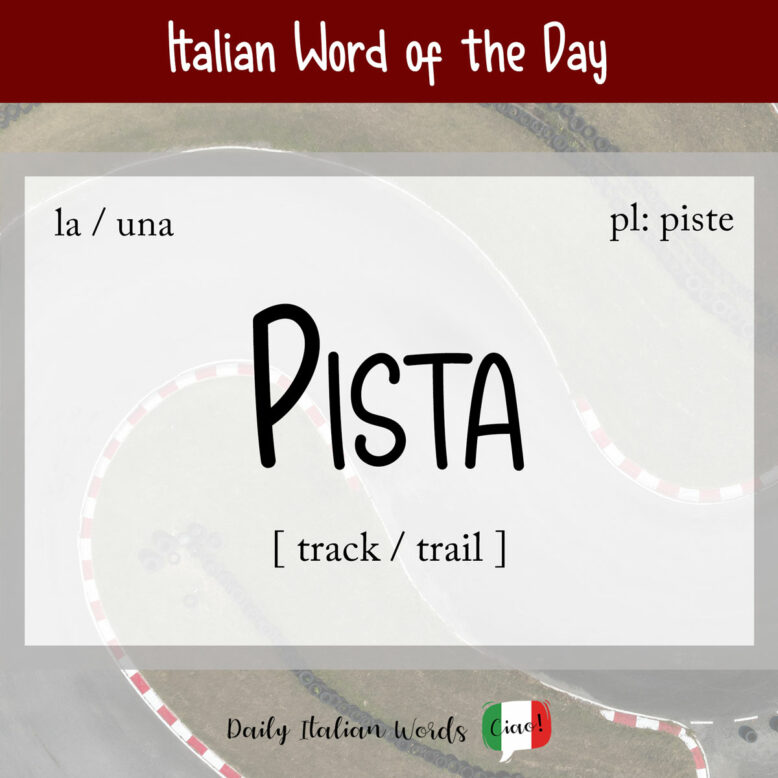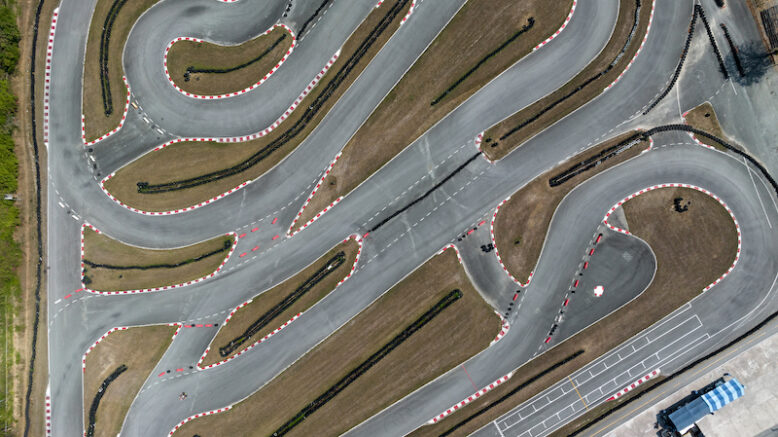I was inspired to share the word pista with you today because my son, who is currently obsessed with ferrovie (railways), has developed a keen interest in building tracks for his toy trains. As you can imagine, this word comes up in conversation at least fifty times a day!
pista
track / trail

According to Devoto-Oli and Treccani, pista is a regional variation of pesta, meaning trace or track. In technical contexts, it is influenced by the French word piste, which you’ll probably recognise from the English word piste, referring to a ski run of compacted snow. Note that the French piste itself derives from Italian.
Pista is a feminine noun that uses the following definite and indefinite articles:
- la pista = the track
- una pista = a track
- le piste = the tracks
- delle piste = some tracks
The first definition of pista you’ll find in the dictionary is a strip of land with a prepared surface used for sports competitions such as running, cycling, motorsports or horse racing. This kind of pista is often circular in nature, with a clear start and finish. Here are a few examples:
- pista di atletica = athletics track
- pista da corsa = race track
- pista automobilistica = car racetrack – note that Italians also say circuito (circuit)
Il pilota ha perso il controllo della sua monoposto ed è finito fuori pista.
The driver lost control of his single-seater and went off the track.

By extension, pista can refer to any space dedicated to sporting or recreational events. When this is the meaning, there are various possible translations including track, rink, floor, slope and so on. Here are a few examples of the most common kinds of piste used for these purposes:
- pista da hockey = hockey rink
- pista da pattinaggio = skating rink
- pista di ghiaccio = ice rink
- pista da ballo = dance floor
- pista da sci = ski slope, ski run, piste
- pista ciclabile = cycle path, cycle lane
- pista di atletica = running track
- pista di fondo = cross-country ski track
Abbiamo trascorso il pomeriggio a giocare sull’enorme pista da hockey del centro sportivo.
We spent the afternoon playing on the huge hockey rink at the sports center.
You will also see pista used to refer to any generic track or trail, such as una pista nel bosco (a trail through the woods).
Pista is also used in the world of aviation. For instance, a pista di volo is a runway, a pista di rullaggio is a taxiway, and a pista di atterraggio is a landing strip.
Finally, pista can be another way of referring to an animal’s orme (paw prints) in addition to the term traccia.
Seguiamo la pista della tigre!
Let’s follow the tiger’s paw prints!
Now let’s move on to the two figurative meanings for pista.
First, pista can refer to a lead in a police investigation. For example, seguire una pista means to follow a lead, while essere sulla pista giusta means to be on the right track. Investigators are always searching for piste attendibili (reliable leads), but if they trust the wrong source, they might find themselves on la pista sbagliata (the wrong track).
The second meaning for pista evolved from the drug world, where it refers to a line or stripe of cocaine.

Idiomatic expressions featuring ‘pista’
Rimettersi in pista
Literal translation: to put oneself back on the track
English meaning: to get back on track
Scendere in pista
Literal translation: to get on the track
English meaning: to join the fray, to take the field
Note: The more common equivalent is scendere in campo.
Pista!
Literal translation: Track!
English meaning: Get out of the way!
Heather Broster is a graduate with honours in linguistics from the University of Western Ontario. She is an aspiring polyglot, proficient in English and Italian, as well as Japanese, Welsh, and French to varying degrees of fluency. Originally from Toronto, Heather has resided in various countries, notably Italy for a period of six years. Her primary focus lies in the fields of language acquisition, education, and bilingual instruction.


